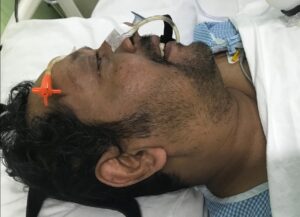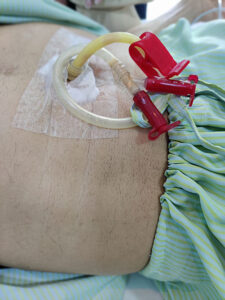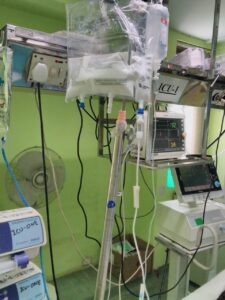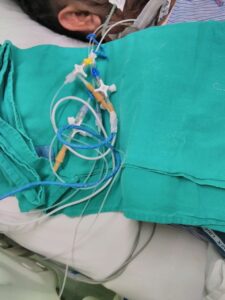Our body is made up of multiple interdependent systems and each one of them requires some specific elements for proper functioning. These elements are provided majorly by our nutrition, some by the environment and some through indigenous manufacturing within our body itself.
So, what we eat matters.
How to gain / lose weight?
How to lose belly fat in weeks?
What diet is good for the heart?
All these answers flood the internet , so, I won’t be discussing all these.
As a surgeon two things matter to me and I am sure to those who have critically ill or chronically ill patients at home.
First, what do we need in our diet?
Second, all those who are not able to eat due to various ailments, how can we provide nutrition to them.
What do we need?
- Calories – we need calories to survive.
How much?
If we consider an average built adult male , he should require around 2600 cal./day – going up to 3000 cal./day with moderate work. For females it should be 2000 cal./day, up to 2500 cal with moderate work.
Who requires more?
Heavy physical activities, sports, exercise and labour demand more calories.
After any major surgery, burns, major trauma.
Serious ailments like TB, malignancy.
- Proteins – They transform into amino-acids. If our body doesn’t get them, they forcefully extract them from muscles causing weight loss and emaciation. There are mainly 9 essential amino acids (Histadine, Isoleucine, Leucine, Lysine, Methionine, Valine, Phenylalanine, Threonine, tryptophan).
- Fat – Major calorie supplier if one gram of each element is considered. Balancing the content, nature and interval of fat intake is very vital.
- Carbohydrates – Instant energy. The major energy supplier.
- Vitamins – Water soluble vitamins:
- B1 (Thiamin)
- B2 (Riboflavin)
- Niacin
- B6 (Pyridoxine)
- Folacin
- B12 (Cyanocobalamin)
- C (Ascorbic acid)
Fat soluble vitamins:
A, D, E, K.
- Water.
Are they enough? What else do we need? And why do we need them?
Yes, we do. They are essential minerals.
Let’s see why we need them.
- Calcium – Heart, muscles, nerves, bones, joints and there is also a role in protection against complications of Diabetes and Hypertension.
- Chloride – blood pressure, pH and the maintenance of balance of body fluids.
- Magnesium – Muscle, nerve function, blood pressure and also manufacturing DNA.
- Phosphorus – Bones and teeth, growth.
- Potassium – Most essential for Heart.
- Sodium – Muscles, blood pressure, fluid balance.
- Sulfur – Skin, tendons, ligaments and manufacturing of DNA.
- Chromium – Fat breakdown, insulin action.
- Cobalt – Form Vit B12, production of RBC and helps in immunity.
- Copper – iron absorption, blood vessels and nerves, Immunity.
- Fluorine – Kidney, bones, teeth, muscles.
- Iodine – Thyroid hormones.
- Iron – Haemoglobin, to transfer O2.
- Manganese – Blood clotting, metabolism.
- Molybdenum – Prevents toxins.
- Nickel – Fat metabolism, hormones, skin.
- Selenium – Thyroid, heart, immunity.
- Tin – Oral health and hair.
- Vanadium – Blood sugar regulation.
- Zinc – Immunity and healing.
Are there some advantages of a non-vegetarian diet?
Yes, a few
- Animal products are more in calorie content.
- B12 deficiency is often seen in vegetarians. Same with vitamin D.
- Protein, a major concern.
- Iron, calcium and zinc deficiencies are unlikely with a non – veg diet.
Any advantages of a vegetarian diet?
Yes, of course
- Low fat, cholesterol. A healthy heart and blood vessels. Less chances of stroke.
- High dietary fibre – healthy intestine.
- Rich in nutrients and minerals.
- Rich in antioxidants, phytochemicals.
What is Metabolism?
Metabolism is the sum total of all the physical and chemical changes taking place within the body. How food is transformed to energy, how enzymes and hormones are formed, muscle and bone growth and also the destruction of them with age or disease.
It mainly consists of Anabolism (Constructive) and Catabolism (Destructive). Balance between these two is the fundamental essential.
When does catabolism increase?
- Major surgery
- Major trauma
- Burns
- Severe infections, septicaemia
- Big non-healing wounds.
It is when the body needs more energy and if they don’t get adequate, they extract it by converting muscle proteins into glucose resulting in rapid weight loss.
A lot is discussed about FIBRES in diet. What do they do? Why should we include adequate fibre in our diet?
- They add bulk to stool, decreasing the transit time in the intestine stimulating Peristalsis. That decreases the chance of infection as well as cancer causing agents (carcinogens).
- They can directly bind the carcinogens and excrete them causing less chance of colo-rectal cancer.
- They bind with cholesterol lowering the risk of coronary heart disease.
- They slow down gastric emptying, slow down glucose absorption, resulting in better diabetic control.
- Provides satiety, helps in weight loss.
- They can transform to short chain fatty acids which lower cholesterol.
- They reduce circulating estrogen levels resulting in lower risk of breast cancer.
- Avoiding constipation can in turn avoid anal and perianal problems like diverticulitis, haemorrhoids, fissures and others.
What about Smoking and consuming Alcohol?
Better to avoid than REGRET.
When should I consider myself obese?
Calculate BMI : Body Mass Index
Weight in Kg / (height in metres)2 :
- 18-25 is normal
- 25-30 is overweight
- 30-35 is Class I obese
- 35-40 is class II obese
- >40 is class III / morbid obese
What can happen if I am obese?
- Hypertension, Diabetes Mellitus
- Low HDL / High LDL
- Coronary heart disease
- Osteo-arthritis
- Stroke
- Gallstones, liver problems
- Sleep apnoea, breathing problems
- Mental illness
- Bones and joints problems.
So, should I stop eating fat in my diet?
No, lipids are required.
- Cholesterol and phospholipids for cell structure, nerve structure and function.
- Metabolic regulation. We won’t have Estrogen and Testosterone without them.
- Prostaglandins for several biological functions of the body.
- Omega 3 fatty acids are very essential antioxidants and have many derivatives.
- And above all, it is a major energy source.
- They form ketones, a major food for the brain.
Why do we need proteins?
- The major structural component of our body.
- Transport : Lipoproteins and Triglycerides.
- Enzyme : they form all enzymes required for digestion and all other purposes.
- Hormones and neurotransmitters like Insulin, Serotonin etc.
- Immunity : Formation of antibodies.
- Acid-base regulation.
- Fluid balance.
- Energy source in crisis and otherwise.
So, our diet should contain protein, preferably in every meal.
Can menopause cause calcium deficiency?
Yes, due to deficiency of Estrogen. Women after 40 and especially after menopause must keep very strict vigilance about calcium and Vitamin D intake.
Calcium rich foods :
- Poppy / sesame / chia seeds
- Milk, milk products, cheese
- Yogurt
- Sea fish, eggs
- Beans and lentils
- Almonds, fox nuts
- Whey protein
- Green leafy veggies
- Rhubarb
Vitamin D rich foods:
- Sea fish, egg yolks
- Cod / salmon
- Liver oil
- Mushroom
- Fortified food and drinks.
What food is good for our hearts?
- Beans, peas, chickpeas, lentils
- Asparagus (rich in folate)
- Broccoli
- Flax seeds, chia seeds, fibres, oatmeal
- Dark chocolates
- Caffeine, green tea
- Omega 3 fatty acids, richest source in fish
- Almonds, walnuts, hazelnuts, pistachios
- Animal liver
- Spinach, tomatoes, vegetables
- One last crowd pleasing element : RED WINE, if taken within limits.
I am Diabetic, what should I include in my diet?
- Fatty freshwater fish
- Green leafy veggies, beans
- Avocados, berries
- Eggs
- Flax seeds / chia seeds / soluble fibres
- Yogurts
- Almonds, walnuts, cashews, pistachio
- Broccoli
- Apple cider vinegar
- Garlic.
What should I avoid if I am Diabetic?
- Artificial sugars, sweeteners
- Trans fats
- White bread, white rice
- Flavoured drinks, yogurts
- Honey in excess
- Rest, all of us know : The KEY to a good Diabetic Control is based on these 3 aspects of equal importance;
- Diet
- Physical activity
- Treatment
Diabetes can lead a life without any complications and implications.
What cooking oil should be used?
Well, that depends on our food habits. But, some good cooking oils are;
- Olive oil
- Mustard oil
- Sunflower oil
- Soybean oil
- Groundnut oil
- Rice bran
- Coconut oil
- Sesame, avocado, walnut oils are still better than other seed oils but best to avoid.
Should we not use Ghee?
No, we should. Ghee (cow ghee) is one of the best cooking mediums. It helps in digestion, brain function and weight loss. Ghee should be incorporated in the cooking medium along with mustard and refined oils.
What oils should we avoid?
All with omega 6 content;
- Cottonseed oil
- Rapeseed oil
- Canola oil
- Peanut oil (Dalda)
- Palm oil
Now,
The surgical aspect. What can we do for patients with high catabolism, if they are not able to eat due to whatever health condition.
One is Enteral feed. It is delivering nutrition to the gastro-intestinal tract. It is most physiological and has maximum positive effects.
How can we provide Enteral feeds?
Mouth, by directly feeding if the patient is conscious.
If not, by a Ryle’s tube through the nose. It goes up to the stomach and liquid food can be given only. A major disadvantage is patient compliance if conscious and also higher risk of aspiration. It is good for short term feeding after surgery or stroke.

N.J Feed. It is a Naso-jejunal feed. Under endoscopic guidance a tube is passed up to the jejunum (small intestine) and another lumen stays back in the stomach. It is good for longer term with definitely lesser risk of aspiration particularly preferred in patients who have undergone stomach surgeries.
F.J. Feeding Jejunostomy. It is a simple surgery where a wide bore tube is inserted in the small intestine. Liquid and semisolid food can be administered. Only negative point is, it can be blocked and needs careful usage. It is very good for terminally ill, stroke and trauma patients and also those who have undergone major abdominal surgery.
PEG, Percutaneous Endoscopic Gastrostomy. Most recent, extremely effective, short uncomplicated procedure. Very very useful in chronically ill patients. Most physiological. No nutrients deficiency occurs and also a semi-solid diet can be administered.

In Spite of all these modalities, sometimes it becomes necessary to give nutrition directly into the veins. It is called TPN : Total Parenteral Nutrition. Yes, there are some disadvantages like hepatic and rectal dysfunction, malabsorptions, nutrient deficiencies. But it is a great modality to administer calories and nutrition in extreme crisis situations.


KNOW about them;
If you have a chronically ill, stroke or malignancy patient at home; consult with your doctor and give utmost importance to deliver nutrition to replenish their needs.
